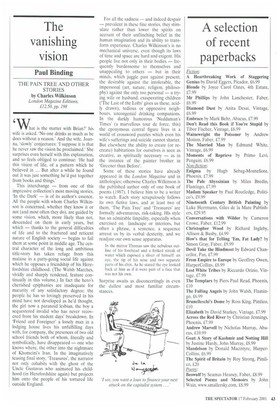vanishing vision
Paul Binding
THE PAIN TREE AND OTHER STORIES by Charles Wilkinson London Magazine Editions. £12.50, pp. 198
hat is the matter with Brian?' his wife is asked. 'No one drinks as much as he does without a reason.' And the wife, Joanna, 'slowly' conjectures: 'I suppose it is that he never saw the vision he proclaimed.' She surprises even herself with this explanation, and so feels obliged to continue: `He had this vision of life, of a pattern which he believed in ... But after a while he found Out it was just something he'd put together from books and things.'
This interchange — from one of this impressive collection's most moving stories, `In the Dark' — is of its author's essence. All the people with whom Charles Wilkinson is concerned, whether they know it or not (and most often they do), are guided by some vision, which, more likely than not, descended on them in early years, but which — thanks to the general difficulties of life and to the fractured and reticent nature of English society — begins to fail them at some point in middle age. The central character of the long and ambitious title-story has taken refuge from this malaise in a party-going social life against which he opposes a friendship of his Herefordshire childhood. (The Welsh Marches, vividly and sharply rendered, feature continually in this volume.) In fact the hero's cherished epiphanies are inadequate for maturity of any satisfactory degree; the people he has so lovingly preserved in his mind have not developed as he'd thought, the girl now a paranoid lesbian, the boy a sequestered invalid who has never recovered from his student days' breakdown. In 'Friend and Foreigner' a lonely man in a lodging house lives his unfulfilling days with, for company, the presences of two old school friends both of whom, literally and symbolically, have disappeared — one who knows where, the other into the nightmare of Khomeini's Iran. In the imaginatively teasing final story, 'Treasures', the narrator not only cohabits with the ghost of the Uncle Gustavus who animated his childhood (in Herefordshire again) but projects him onto the people of his tortured life outside England. For all the sadness — and indeed despair — prevalent in these fine stories, they stimulate rather than lower the spirits on account of their unflinching belief in the human imagination and its ability to transform experience. Charles Wilkinson's is no mechanical universe, even though its laws of time and space are hard and exigent. His people live not only in their bodies — frequently burdensome to themselves and unappealing to others — but in their minds, which juggle past against present, the desirable against the intolerable, the impersonal (art, nature, religion, philosophy) against the only too personal — a trying wife or husband, exasperating children (`The Last of the Lofts' gives us these, acidly drawn), tedious or oppressive neighbours, uncongenial drinking companions. In the darkly humorous `Neddaman's Times' (a marvellous tour de force, this) the eponymous central figure lives in a world of crossword puzzles which even his wife's sufferings and suicide cannot shatter. But elsewhere the ability to create (or recreate) habitations for ourselves is seen as creative, as spiritually necessary — as in the instance of the painter brother in 'Greener than Before'.
Some of these stories have already appeared in the London Magazine and in anthologies; otherwise Charles Wilkinson is the published author only of one book of poems (1987). I believe him to be a writer to watch. Each story scrupulously follows its own fictive laws, and at least two of them. 'The Pain Tree' and 'Treasures' are formally adventurous, risk-taking. His style has an admirable limpidity, especially when exercised on landscape or interiors, but often a phrase, a sentence, a sequence arresst us by its verbal dexterity, and we readjust our own sense apparatus.
In the mirror Thomas saw the nebulous outline of his forehead and a forked streak of water which exposed a sliver of himself: an eye, the tip of his nose and two separate parts of his chin. As he stared the eye looked back at him as if it were part of a face that was not his own.
Surprise awaits us disconcertingly in even the dullest and most familiar circumstances.


































































 Previous page
Previous page